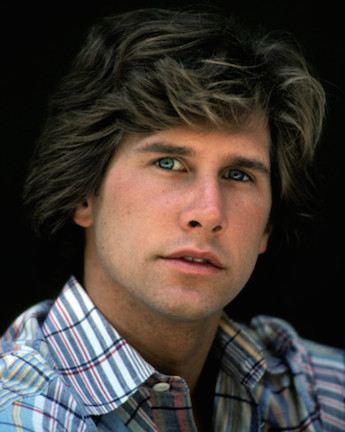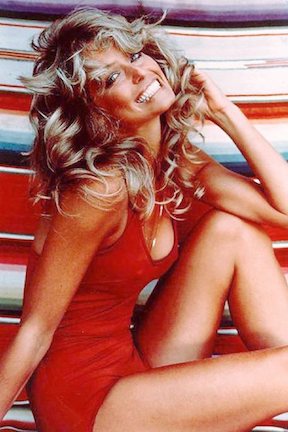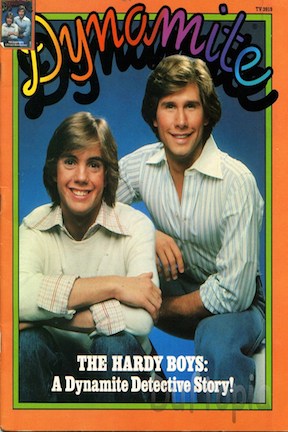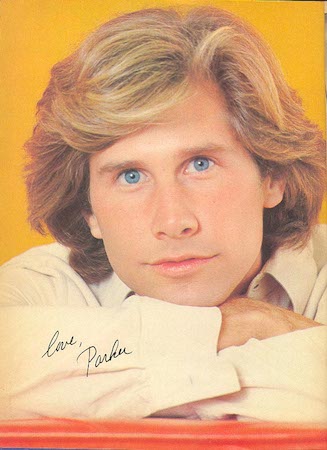IT’S NOT CLEAR that it was a crush, not by any standard definition I was accustomed to at that time anyway:
See person I’m attracted to.
Find them funny or mysterious, both maybe.
Try to figure out ways to be near them.
Soak-up their energy, and possibly consume them, if not physically, than metaphysically.
The feeling will be unrequited of course, at least initially. That’s certainly my experience.
The feeling will also be followed by a crippling desire that dogs me throughout the day, leaving me restless at night, and unable to sleep, with little likelihood of that changing.
So maybe I am incorrect, maybe it was very much like the crushes I was accustomed to. Maybe what was different is that this crush was not only unattainable, but male. Though not unattainable because said crush was male, though that was different than my standard crush, but because said crush was Parker Stevenson, and how was that going to work?
It wasn’t. I got that. And even then it wasn’t quite sexual anyway. I don’t think. It’s what he was, and what he represented, a celebrity who seemed like someone I could touch.
Interesting phrasing I suppose.
But Parker seemed real, and that’s what’s important here.
It’s important in the same way that the poster of Farah Fawcett which hung on my bedroom wall during those years is important.
You may recall that poster if you spent any time in a tween boy’s room circa 1980.
Her hair is spectacular, wave after wave of blonde tendrils aloft and crashing across your brain.
He smile is otherworldly, and unreal, Blade Runner unreal, it is like nothing you’ve ever quite seen before, and you aren’t sure you are actually seeing it now.
And then there is the arch of her back and the red bathing suit, anyway enough said.
She too was a crush, but Farah as a crush was more about fantasy, and nothing against Farah, it’s just that she was an illusion, untouchable, and possibly a figment of our collective imagination anyway.
And she still might be.
But Parker Stevenson wasn’t that, nor was he Shaun Cassidy, with his blonde, pin-up, good looks; pseudo pop-singing prowess; famous half-brother; and general aura of Hollywood royalty.
Of course even then it wasn’t just Parker Stevenson’s realness and approachability; his good, but not great looks; the welcoming smile, and the pragmatic style he brought to his groundbreaking role as Frank Hardy, one-half of the Hardy Boys, the other half being the aforementioned Shaun Cassidy, the YA lit detective brothers who were prone to referring to mistakes as “boners.”
I know, I know, that’s base of me to even make that reference, and yet, back then the word boner made me snicker.
Okay, maybe it still does.
And yet, it was even more than all of that.
The world itself was so much smaller then, and this wasn’t merely because we had no internet access, or because most of us never flew anywhere, it was because while our access to the larger world was largely driven by television, there were only like three channels to choose from, and so if you liked something, you found yourself really liking it.
It’s kind of like having an office crush. Your co-workers comprise a really small sample of the actual opportunities available to you outside of your office, but with the choices so limited, that which you have access to, seems much better than it actually is.
Which is not to bag on SWAT, Charlie’s Angels, Dallas or Fantasy Island, or any of my co-workers, but again, this is about the real, and compared to the Hardy Boys these shows were all cartoons, funny and worthy of our obsessions, but certainly not relatable in any real world way.
Further, and certainly just as important, Parker Stevenson had a column in Tiger Beat. You remember Tiger Beat don’t you? It was the source of all things teen celebrity worship and filled with an ephemera that bordered on gossip and rumor, but never quite crossed-over to outright lies or scandal.
Well, not unless you consider Kristy McNichol and Tatum O’Neal fighting over the affections of Matt Dillon on the set of Little Darlings scandalous?
Which you might, which I get, because I am you, and you may just be me, which I suppose I am sorry to hear, sorry for you anyway.
The “me” I am referring to by the way, is the “me” who bee-lined for the magazine rack in the GIANT supermarket on Pennsylvania Avenue near my house growing-up.
And what did Pennsylvania Avenue look like in the late 70’s and early 80’s?
Much like it does now I suppose. There was the GIANT and a series of small houses and apartment buildings, with their peeling paint, sagging front porches; families, young couples, and students; the endless trees towering above them, their branches climbing into the always gray skies; all of which poured onto Vestal Avenue, Pudgie’s Pizza, the gas station, the AM/PM, and ultimately the closed bridge which brought you to the Broome County Arena and downtown Binghamton, such as it was.
The magazines themselves were by the bread rack, which abutted the walled-in space where GIANT casually tossed its extra cardboard boxes. An act that led to the formation of a teetering mountain of boxes that was always threatening to topple Jenga-style on to some unsuspecting shopper below, yet never quite did.
It was there, in the shadows of the box mountain, that you could find everything from Mad and Cracked to National Enquirer, TIME, Newsweek, and People, Sports Illustrated, and because this was upstate New York, Guns & Ammo and Soldier of Fortune.
It was also where you could find me, sweaty and furtive as I read Tiger Beat, absorbing its glossy photos, the pages sticky to the touch, the smell of ink heady, and slightly haze-inducing, the experience more akin to sniffing low-grade paint fumes than the high that comes with reading great literature, and consuming Tiger Beat’s endless advice columns, including one by none other than the casually sweater-vested Parker Stevenson in all of his grinning glory.
As crushes tend to do, Parker Stevenson had come to represent a way out to me, and while I had no particular feeling at the time about the need to escape Binghamton, I had very particular feelings about remaining obscure, unknown, and unwatchable.
Through Parker Stevenson I saw the key to becoming a performer, and while performing per se held no special appeal to me, it did represent a vehicle, a way to becoming whatever he was, someone that someone else cared enough about to put their picture in a magazine.
One day when I got home from GIANT, I stole my way up to the little wooden desk in my room which was tucked away in the alcove below the window that faced the street.
On that window was a Tot Finder sticker that refused to peel away or become unstuck, a reminder for many years after, that not only was the tot who slept in that room long gone, but that I was the very poor parent I knew myself to be, unable to successfully place one on my own children’s window some thirty years later, the sticker having peeled off within days, and fallen to the floor under the shades, unstuck and forgotten, no tots likely to ever be found in their room.
At that desk I crafted my letter to Parker Stevenson, pouring out my great desire to perform, to be an actor as he was, asking him what secrets he might impart, and what advice he might suggest for the desperate, young hopeful on the other side of the pencil.
I wrote and re-wrote that letter, honing my language, and trying to imbue the message with the sense that he alone could make a difference in my life, and that I believed in his ability to show me the way, just as I believed he could come to believe in me and my ability to follow the path he would surely outline for me.
The two of us had something special. I was sure of it, and if he didn’t somehow know that already, he certainly would after digesting my heartfelt missive.
Copied, and recopied, I lovingly escorted the hand addressed letter to the mailbox at the bottom of Brookfield Road, and then I waited for my response.
To say I believed that this letter represented some kind of Golden Ticket would be accurate. I was caught up in the throes of a fantasy. But to say I was disappointed that I never heard back from Parker Stevenson or saw my letter in print, would not be equally as accurate.
I didn’t truly expect anything to happen. I just wanted it to, and wanting something to happen is a lot different than doing anything possible to make it so.
Say for example taking an actual acting class, seeking an agent, or asking my parents to drive me to auditions, something people who want to perform generally engage in.
But again, this was less about being able to perform, something I truly had little interest in, than about being someone I was not, someone who is loved by the masses and receives ongoing affirmation that this love is real, and celebratory, because of who, and what, you are.
Something we can achieve, at least a version of it anyway, when someone crushes on us with the same intensity we are crushing on them.
Which brings us back to Parker Stevenson and my sort of crush, sort of something, though whatever it was, or might have been, it was certainly unrequited, no intensity, no love, no nothing.
It was also something I chased no harder than sending a letter, somehow knowing anything more would be ridiculous.
The question might be whether this lack of returned crushness undermined my ability to crush going forward, the disappointment somehow inhibiting my tweaky crushing energy, ultimately making me more self-conscious about what we can expect when we fall for someone, yet expect nothing in return?
It did not.
I crushed hard after that, and I still do, still obsessing, and still hoping that these obsessions will bear fruit, yet knowing that crushes come and go, and if one doesn’t pay off in any kind of satisfying fashion, than the one after that might.
And yet, I still don’t quite expect that things will just happen for me, that hasn’t changed, and that may be healthy, pragmatic even, just like my perception of Parker Stevenson himself all those years ago.
Which is to say, that maybe I learned something from him after all.
Because in the same way I failed to chase Parker Stevenson, or the idea that he represented a path, is a kind of failure I now know all too well.
And what kind of failure is that?
It is the kind of failure which recognizes that I won’t do absolutely anything to get something I want so badly, which is to be a successful novelist, or maybe somehow write for television or the movies.
I won’t move to Los Angeles or Brooklyn, even though there may be opportunities in those places that Chicago doesn’t possess, because the idea of doing so makes me too nervous to try and actually grasp what those opportunities may be.
I won’t stop working full-time to write, because then I would compromise my health insurance and retirement plans.
I won’t ignore my wife or kids or disappear for days at a time just so I can get more done, because I don’t want to be that kind of husband and father.
And so, even though I am insanely jealous of those who can do some or even any of this, I am forced to wrestle with knowing that this is the kind of failure that never quite allows me to take a leap of faith, while still believing that even if things fall apart, and the pieces have to be picked-up, it will have all been worth it.
I’m not even sure anymore that I really sent that letter to Parker Stevenson, but I want it to be true, because I want, need, to believe, that I took a chance, a restrained chance maybe, but still one where I was willing to at least risk a different kind of failure, that of being rejected.
I want this to be part of my story, because rejection unlike risk is something I have come to embrace, and I have always known I would have to do so if I was going to crush again, or want anything at all.
Because ultimately, being rejected has nothing to with whether I am special or loved or deserving of affirmation, it is a necessity, and the next person might feel differently than the one rejecting me now.
And in that I’m sure Parker would agree.







I don’t recall reading Parker’s columns but I remember Tiger Beat and the Farrah poster hanging in my Uncle’s game room quite well. I grew up in a similar–but different–small town in NY. You captured that youthful yearning “to be something more” beautifully. Great post!
I do not know if it’s just me or if erhaps everyone else experiencing issues with your website.
It appears as if some of the text in your pposts are running off
thee screen. Can somebody else please provide feedback and
let me know if this is happening to them too? This could be a issue with my browser because
I’ve had this happen before. Thank you